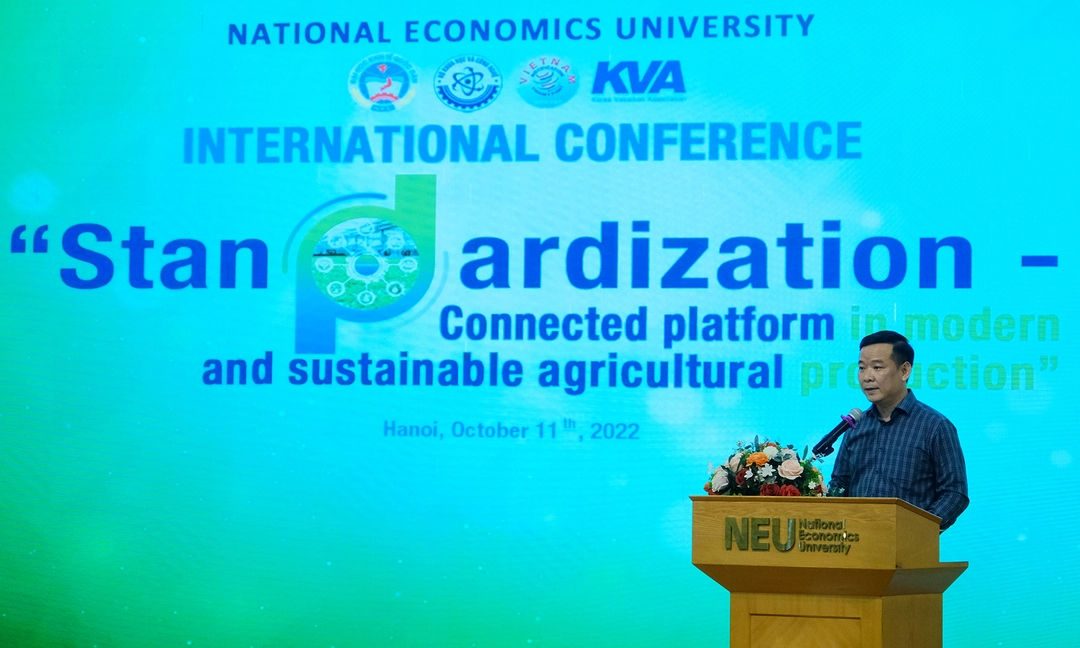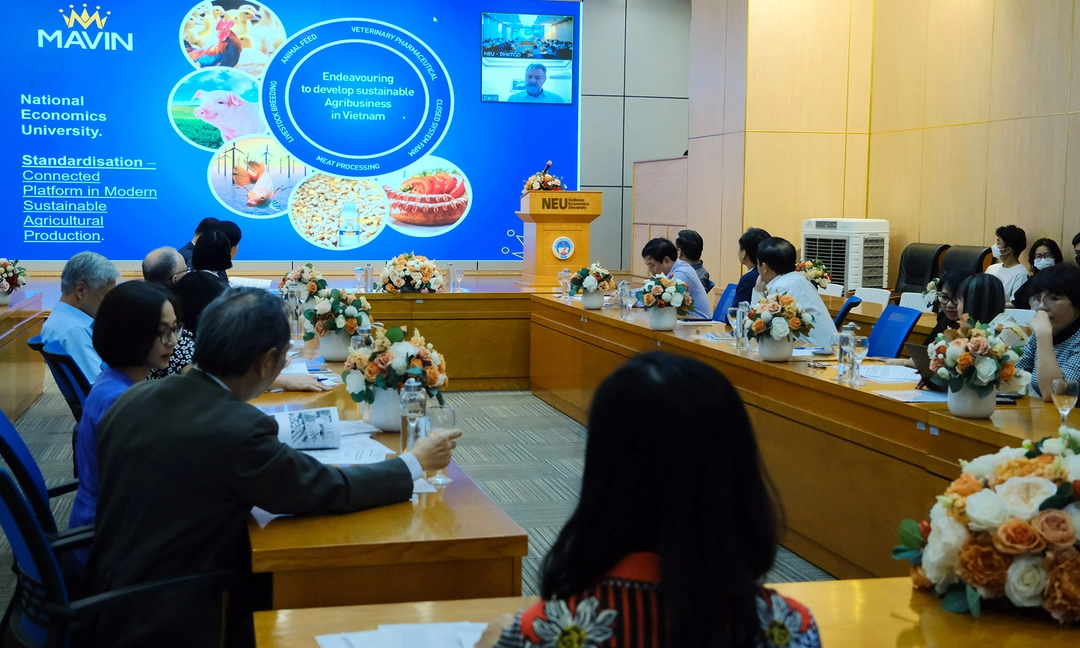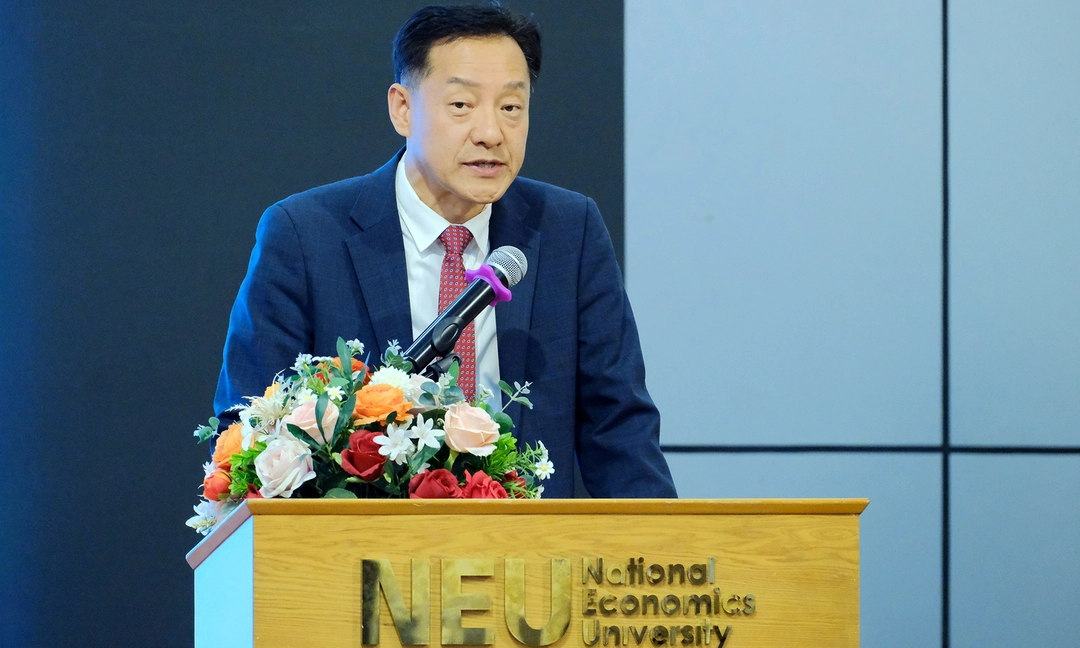Experts believe that the development, expansion and updating of standards, especially in the field of agriculture, will help Vietnam develop sustainably.
Vietnam is a country with many potentials and advantages for agricultural development. Even when affected by Covid-19, the agricultural sector still achieved a growth rate of nearly 2.9%; agricultural, forestry and fishery exports reached a record 48.6 billion USD in 2021, up 14.9% compared to 2020. Vietnamese agricultural products are available in almost all foreign markets, including fastidious markets such as the United States, China, Japan, and South Korea.

Assoc. Prof. Bui Huy Nhuong, Vice Rector of National Economics University gave the opening speech of the workshop
However, Vietnam's agricultural products are facing some challenges. At the workshop on the afternoon of 11/10, Assoc. Prof. Bui Huy Nhuong, Vice Rector of the National Economics University, pointed out a number of issues such as: raw and preliminary exports still account for 60%, the proportion of products according to sustainable standards, new international certification is about 10%, many products have not yet built a brand, some export orders are returned because they are not guaranteed in the production and processing process.
"Standardization is an essential requirement for agribusiness production in the process of globalization. Producing in modern ways and technologies, with clear and transparent standards, will help Vietnam's agricultural sector reduce risks, develop sustainably, and be proactive in the face of fluctuations in the natural environment as well as the world economy", Mr. Nhuong said.
According to Mr. Nhuong, standardized production will contribute to improving productivity, quality and efficiency of production and business; help open the market and enhance the position of the country's agriculture in the domestic and world markets.
As of 2021, out of a total of 13,350 standards in the national system, Vietnam's international standard harmonization rate will reach about 60%, across 42 fields. To participate more deeply in international standardization activities, especially in the field of agriculture, Assoc. Prof. Bui Huy Franchise noted the focus on training human resources in the field of standards and quality.

Mr. David John Whitehead, Chairman of Mavin Group spoke online at the forum.
"We are aware of this problem and strive to become a place to produce and supply products with transparent information, traceability, as well as ensure hygiene and food safety issues," Whitehead said.
In the face of global changes, the agricultural sector has many opportunities to participate in value chains, according to Whitehead. However, in order to seize the opportunity, Vietnam's agricultural sector needs to integrate action plans on the application of science and technology and innovation in production directions.
Since 2007, when Vietnam officially became a member of the WTO, agriculture has been bound by international practices. Mavin's leader said that protection through reduced tax policies, forcing manufacturers to improve product quality, is also to take advantage of foreign capital flows.
"We highly appreciate that Minister Le Minh Hoan orients people to transform their thinking from production to agricultural economy, with a focus on producing more high-quality products, meeting the increasing requirements of the market. Besides, the Minister also proposed many plans to build the countryside into a place worth living. The goal is to make Vietnam's agriculture advanced, modern, and environmentally friendly," Whitehead said.

Cho Kee-heon, secretary general of the Korea Business Evaluation Association (KVA).
Having many years of experience in Vietnam, Mr. Cho Kee-heon, Secretary General of the Korea Business Evaluation Association (KVA) presented how to standardize technology when building smart farms.
At KVA models built in Korea, smart farms are a combination of many factors. In addition to the usual production, consumption and distribution tasks, this modern model aims at multi-value integration, when the output of one production chain is the input of another. For example, cattle manure is used to fertilize trees, or water from ponds can be directed into orchards.
Covering this infrastructure are technologies such as IoT, cloud computing, artificial intelligence ... There, any changes to the closed production chain are monitored at the control center, in order to make the necessary adjustments in time.
"Smart farms are not merely a production concept but also an agricultural reform based on modern technology through the value chain. The problem is to expand the standards of smart farms, avoid conflicts due to incompatibility, and find suitable solutions for the soil conditions of each locality," Cho recommended.